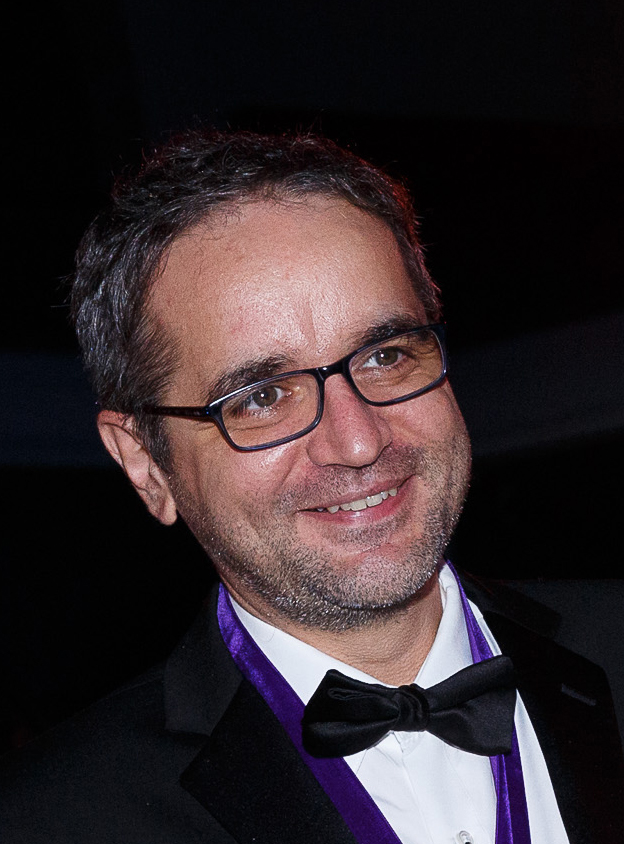Mircea Dincă Joins Faculty at Princeton Chemistry
In another high-profile hire that will draw a renowned senior faculty member to Princeton Chemistry, the department will welcome inorganic chemist Mircea Dincă as Alexander Stewart 1886 Professor of Chemistry for the start of the 2025-2026 academic year.
A magna cum laude graduate of Princeton University’s Class of 2003, Dincă has made pioneering contributions to our understanding of the properties of metal-organic frameworks, or MOFs, highly porous materials that show promise in energy and environmental applications.
Dincă joins Princeton Chemistry from his position as Professor of Chemistry and W. M. Keck Professor of Energy at the Massachusetts Institute of Technology.

Princeton Chemistry's new Alexander Stewart 1886 Professor of Chemistry Mircea Dincă.
“Part of the reason for this move is that I was a Princeton undergraduate, and I had a fantastic time there,” said Dincă from his office in Cambridge, Massachusetts. “But on the less nostalgic side, I have noticed over recent years that Princeton is on a very positive trend with respect to increasing investment in the sciences and in fundamental research. It is particularly obvious how this trend has impacted the Department of Chemistry.
“It’s all a sign of the investment the University and the department have made in support of faculty and graduate student education and facilities – everything that goes along with having a top research program in chemistry.”
Department Chair Paul Chirik, the Edwards S. Sanford Professor of Chemistry, said: “We are thrilled that Mircea will be joining our faculty and returning to Princeton. He will add additional strength to our materials and inorganic groups, bring world-class research in conductive MOFs, and will make important contributions to various energy science and sustainability initiatives across the Princeton campus.
“Mircea undoubtedly will attract even more world-class graduate students and postdocs to Frick laboratory.”
At Princeton, Dincă will continue his work with MOFs, to which he sometimes refers metaphorically as “sponges on steroids.” MOFs are high-surface area, highly porous materials made from layers of organic ligands connected by metal ions or clusters. These materials are typically complete electrical insulators, but Dincǎ’s discovery and development of a whole new subclass of conductive MOFs established him as a leading authority on these compounds.
His lab further utilizes the internal porosity of MOFs as hosts to different entities, such as water or solvated metal ions, which could facilitate efficient air-conditioning applications, fresh water harvesting systems, or new energy storage devices like batteries and supercapacitors.
“With these new colleagues and new resources, I would also like to look at other—tangential, for now—applications, like a broader program in water and water-based electrolytes so we can understand more about how water behaves in confined media like these tiny pores,” he added.
But there are other research possibilities too: an investigation on the coupling of these multi-functional materials with biological mediums for novel composites, for example, and new collaborations with Princeton engineers and energy faculty at the Andlinger Center for Energy and the Environment. There is even the possibility at some point, he said, of pursuing areas of overlap between his amateur mushroom hunting hobby and the study of metals.
A History with the Department
As an undergraduate at Princeton, Dincă took a class in organometallics with Jeffrey Schwartz, now professor emeritus at Princeton Chemistry. He liked it so much that he sought out Schwartz and asked to do research in his lab. “I probably stood out to him because I was an annoying freshman,” said Dincă. “But I remember Jeff as one of the best teachers I had in my undergraduate career.”
After graduating with an A.B. in chemistry in 2003, Dincă went on to the University of California, Berkeley, receiving his Ph.D. in 2008; and then on to MIT for postdoctoral work. He was named an assistant professor there in 2010 and promoted to full professor in 2020 when he was also named to the Keck chair.
In 2021, Dincă was invited back to Princeton Chemistry as a Mislow Fellow to deliver the Mislow Honorary Lecture.
He will be recruiting graduate students and postdocs during the Winter 2025 recruiting season at Princeton Chemistry.
Dincă has received numerous awards throughout his academic life including a Brown Foundation Investigator Award in 2023, a Blavatnik National Award in Chemistry in 2021, the ACS Award in Pure Chemistry in 2018, and the Alan T. Waterman Award in 2016. He is a Fellow of the American Association for the Advancement of Science and of the Royal Society of Chemistry and serves as an Associate Editor of the journal Chemical Science.
He has authored more than 165 journal articles and holds 10 patents.
Dincă was born and raised in Transylvania, Romania until he was 19 years old. His father was an Orthodox priest and his mother was a kindergarten teacher.
Dincă and his wife, Alexandra, have two children, a daughter and a son. They will be moving to Princeton in the new year.
